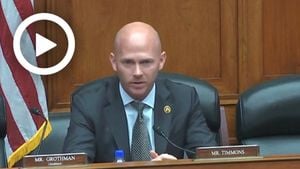Former President Donald Trump remains a dominant figure within the Republican Party, and as he gears up for his potential second presidential run, his foreign policy stances are coming under renewed scrutiny, particularly concerning the volatile dynamics of the Middle East. With tensions mounting across the region, Trump's approach could significantly shape America's role on the global stage, especially as various conflicts are shaking the foundations of long-standing alliances.
Trump's previous term was marked by bold but often controversial decisions, such as moving the U.S. embassy to Jerusalem, which ignited strong reactions from both his supporters and detractors. Fast forward to 2024, and the Middle East is again at a crossroads, with heightened uncertainties impacting relations not just within the region, but also between the U.S. and its traditional allies.
Recent developments have seen the Israeli-Palestinian conflict escalate once more. The humanitarian crisis is dire; reports from international organizations paint a chilling picture of suffering among civilians. Trump's critics are quick to point to these realities, warning against another round of unilateral decisions by the U.S. under his leadership. Analysts caution what could happen if he were to re-implement policies from his first term without sensitive diplomacy.
The Iranian nuclear deal, which Trump vehemently opposed, has also resurfaced as a significant point of contention. The International Atomic Energy Agency has warned of rising tensions as Iran continues to enrich uranium, threatening to breach limits established by the 2015 agreement. For Trump, the Iran issue is particularly pressing, as he could either double down on his hardline tactics or pivot to seek collaboration with partners like Israel and Saudi Arabia, who share concerns about Iranian influence.
On the flip side, some experts believe Trump’s possible return to office might open avenues for fresh dialogues. Trump has indicated interest in reexamining relations with various Gulf states, ranging from Saudi Arabia to the UAE, who could play pivotal roles as peace brokers. During his last term, several notable peace agreements were brokered, including the Abraham Accords, which normalized relations between Israel and several Arab nations. This momentum could be a focal point for his campaign.
Yet, the picture is complicated by domestic challenges, which Trump must navigate even as he presents himself as the candidate capable of re-establishing U.S. dominance abroad. Various polls suggest the electorate is divided on foreign policy issues, particularly as rising energy costs and inflation dominate their concerns. National security is important, but it often ranks lower than economic stability for many American voters.
A recent poll also highlighted the percentage of Republican voters who are fatigued by foreign military engagements, preferring instead to focus resources on domestic infrastructure and welfare. This 'America First' ideology – which Trump championed during his first campaign – still resonates with many, signaling he may recalibrate his strategies if he gains the Republican nomination again.
Another facet of this narrative is Trump's relationship with NATO. He has often been skeptical of the alliance, questioning its relevance and demanding more contributions from member states. Should he win the presidency, these views could usher in significant changes to U.S. foreign commitment. While this might resonate well with his base, it could alienate traditional allies and embolden adversarial powers.
At this juncture, Trump's place at the center of the political discourse around Middle East policy showcases the larger ideological battles facing the United States. It emphasizes the choice between hardline nationalism and multilateral approaches, alongside the delicate balance required for peace and stability within the Middle East. The stakes are too high; with lives and national interests at play, any misstep could reverberate through global economies and geopolitical alignments.
Public reactions and opinions about Trump's potential return to power are as varied as the complex layers of global politics. Observers remain cautious, noting the influence of social media and misinformation, which can skew perceptions and create disconnects between reality and public opinion. Navigators of this political minefield will need to tread carefully, ensuring clear communication and effective policies are prioritized.
With the upcoming presidential election, candidates are already positioning themselves within this powerful narrative. Democrat leaders are preparing counter-strategies to address the challenges posed by Trump’s past and potential future policies, particularly emphasizing the need for collective action against threats. Their proposals aim to reclaim the narrative on America's engagement in foreign affairs, underscoring the importance of strategic alliances and humanitarian diplomacy.
With Trump stirring the political pot yet again, what will be his blueprint for foreign policy? And how will it react with the enduring crises of the Middle East and the broader world? The answers may lie not just within Trump's campaign strategy but also within the willingness of the American public to support bold internationalism, or to retreat altogether from the world stage. Only time will reveal how these events will fold out, but it’s clear the discussions about America’s next steps have only just begun.



